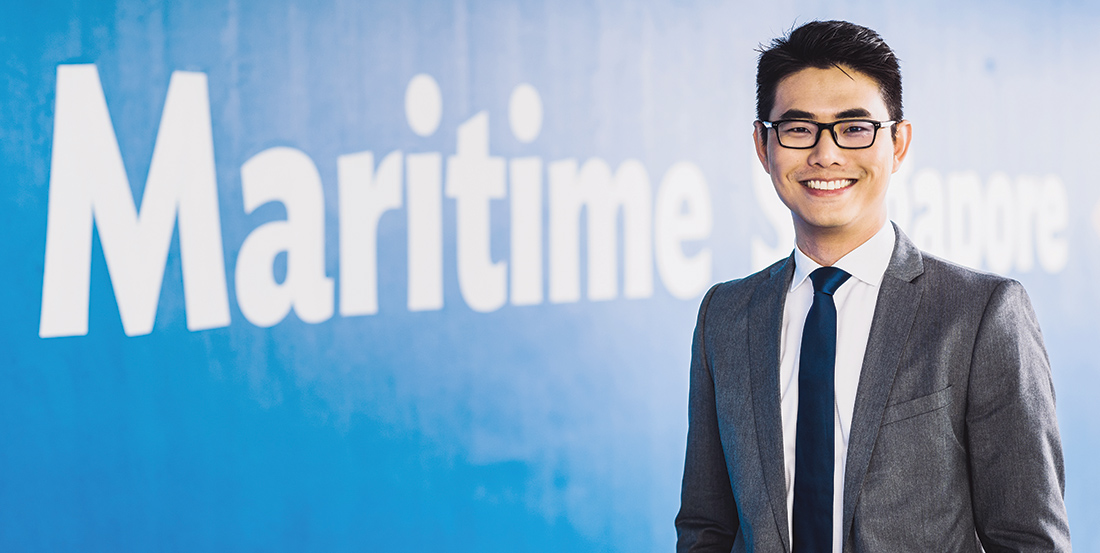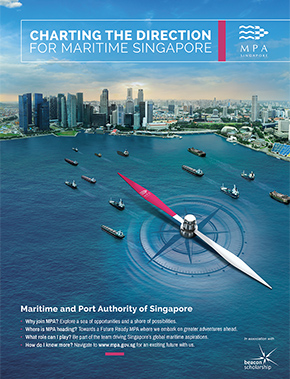O ur maritime industry is replete with business and career opportunities. Think about the industry employing over 170,000 people in more than 5,000 maritime establishments, and how it contributes to about seven per cent of Singapore’s GDP. In fact, Singapore is the leading International Maritime Centre (IMC), housing a dynamic ecosystem of maritime and port services.
The Maritime and Port Authority of Singapore (MPA)’s mission is to develop Singapore as a premier global hub port and IMC, as well as to advance and safeguard Singapore’s strategic maritime interests. Singapore is now the world’s top bunkering port, world’s busiest container transshipment hub and the fifth largest registry in the world with more than 130 shipping groups based here.
Contributing in different ways to our bustling maritime industry are MPA Scholars Zhang Rui and Quincy Kwek. Zhang Rui works as Assistant Manager in MPA’s IMC Division, Industry Manpower Development Department, where he supports the development of Singapore’s maritime manpower capabilities to enhance our competitiveness as an IMC. On the other hand, Quincy works on the frontline, rendering assistance to companies on documentary registration while working closely with the Singapore Registry of Ships. During occurrences of security marine incidents, ship owners look to her as she plays a critical role in the coordination of recovery actions.

Kwek Ziyan Quincy
MPA Local Undergraduate Scholar
Assistant Manager (Registry)
Taking Challenges in their Stride
In Zhang Rui’s line of work, he expands the industry’s manpower capabilities in various ways. For instance, he develops and manages SkillsFuture programmes and maritime manpower initiatives to grow our maritime workforce, as well as engages with higher education institutions to develop and regularly improve key maritime programmes. He also oversees the administration and promotion of the Tripartite Maritime Scholarship, one of MPA’s industry talent development schemes to groom promising seafaring professionals.
To him, the most fulfilling aspect of his job is seeing his plans in grooming maritime professionals gain traction and take shape. He elaborates, “Seeing through end-to-end policy-making processes, from identifying issues and formulating strategies, to ultimately implementing policies, is fulfilling. We know our efforts are meaningful when we see them translating into tangible benefits for Maritime Singapore, and when they help to improve the career development prospects of maritime professionals.”
But his job – as is any other – is not without challenges. He shares, “It can be challenging trying to understand the concerns and interests of various stakeholders, and eventually seek ways to work towards a mutually beneficial outcome. I think this takes patience, industry knowledge, the ability to make sound decisions under risk and uncertainty, and sharp negotiation skills in order to do well. These are attributes I’m still trying to develop as a relatively young officer.”
On Quincy’s end, as an Assistant Manager of the Registry Department under the Shipping Division, she highlights that being at the customer service front is never easy. “It is sometimes a challenge to balance the interests of our ship owners and that of the Flag Administration. The outcome of our decisions may not always be favourable to our customers. However, through numerous discussions with ship owners and colleagues, we always strive to work out the most feasible solutions,” Quincy explains.

Zhang Rui
MPA Overseas Undergraduate Scholar
Assistant Manager (Industry Manpower Development)
Opportunities for Young Officers
Although Zhang Rui and Quincy have been with MPA for no longer than two years, both scholars have gained opportunities that have translated into deeply memorable career episodes. Zhang Rui remembers making his first work trip to London, where he was able to witness first-hand the process of attracting overseas investments and promoting Singapore’s industry capabilities. While he was there, he engaged key executives in overseas maritime headquarters to understand their business plans in Singapore, and offer solutions to address their business concerns.
Of the experience, he tells us, “It reminded me that Singapore’s success today as a global business hub and choice destination to set up regional headquarters is not something to make light of. It involves years of hard work and planning for us to reach the stage of development that Singapore is at.”
Quincy also recounts experiences of work trips to London for International Maritime Organisation (IMO) meetings. “As IMO is the global standard-setting authority for the safety, security and environmental performance of international shipping, it creates a regulatory framework for the shipping industry that is fair and effective, universally adopted and implemented. Such information was only made available to us during school lectures back when I was an undergraduate at the Nanyang Technological University! It was indeed an eye-opening experience to be physically present at such a classified meeting where delegates gather to discuss international issues. It definitely brought my classroom knowledge to life,” Quincy muses.
Choosing a Career
Having been in the shoes of Junior College (JC) students once, both Zhang Rui and Quincy offer their nugget of wisdom to JC students exploring their scholarship options. Quincy shares, “We may never be able to predict our own future, but an important first step is to envisage where you could possibly kick start your career. We need to acknowledge that our interests may change over time – even if you don’t end up doing what you love, you would need to learn to love what you do. A scholarship is a platform to make your first career step, and it often leads to an array of developmental opportunities.”
Zhang Rui rounds off with a quote, sharing, “I read somewhere that the best career you can have is in doing something that is at the intersection of what you are good at, what you are interested in, and what is beneficial for the world. If the scholarship you are considering ticks these boxes and enables you to vault closer towards that ideal career, then go for it.”

